'Too slow to call time-on': Were Port gifted 19 extra seconds in crucial final-term moment?
Midway through the last quarter, the umpire called time-on as Darcy Byrne-Jones was lining up for goal, inadvertently ensuring 19 extra seconds remained on…
Opinion
The temptation is always to go with the team that won the previous week over the team that lost. And that temptation is almost always wrong.
In the 21 previous seasons using this finals system – double-chance losers meeting elimination-final winners in the semis – the higher seeded teams coming off the loss are an astounding 34-8 against the lower seeded winners from the previous week, a winning percentage of 81 per cent.
Among those eight losers, none were top-seeded teams and only one second-seeded team has ever gone out in straight sets – sorry, Brisbane, but that would be you, in your first finals series with this group of players in 2019.
Are they therefore susceptible to an upset in the four-five match-up against the team they edged out by a stray minor score and a Charlie Cameron goal after the siren?
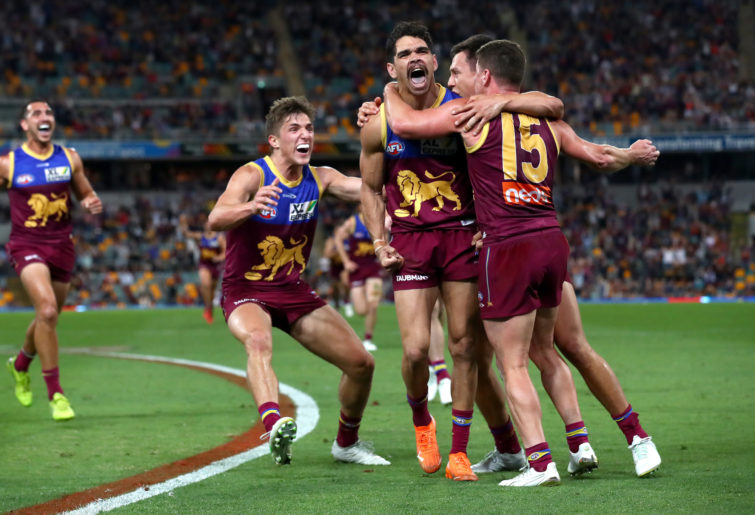
(Photo by Jono Searle/AFL Photos/via Getty Images)
Maybe. Certainly the Bulldogs will be chomping on their leashes to get at them for sending them through the long way at the last minute.
And what about Geelong? Since their last title ten years ago in 2011, they’ve finished below their seeding every year except last year, when they made the grand final despite not being seeded first or second. And every Cats fan is hoping that 2020 broke the curse!
But in the eight prior seasons, here are their results:
2019 – seeded first, out in the prelim final (rather than grand final)
2018 – seeded eighth, out in the elimination final (okay, I guess you can’t do worse than eighth…)
2017 – seeded second, out in the prelim final (rather than grand final)
2016 – seeded second, out in the prelim final (rather than grand final)
2015 – seeded tenth, shot over par on the golf course during September
2014 – seeded third, out in the semi-final (rather than making the prelim)
2013 – seeded second, out in the prelim final (again)
2012 – seeded sixth, lost the elimination final (rather than making the semi)
So what might happen in the semi-final coming up? If this eight-year pattern is revived, they’ll have to lose to the Giants and fail to make the prelim stage as a third-place team. Otherwise, they’ve achieved their expectation as a top-four club by being one of the last four left.
Or, if you believe the curse has been broken, then so be it. A victory this weekend and another one against Melbourne the following week gets them into the grand final for the second year in a row (with no Richmond waiting for them!).
Up to you and what you want to believe, I guess.
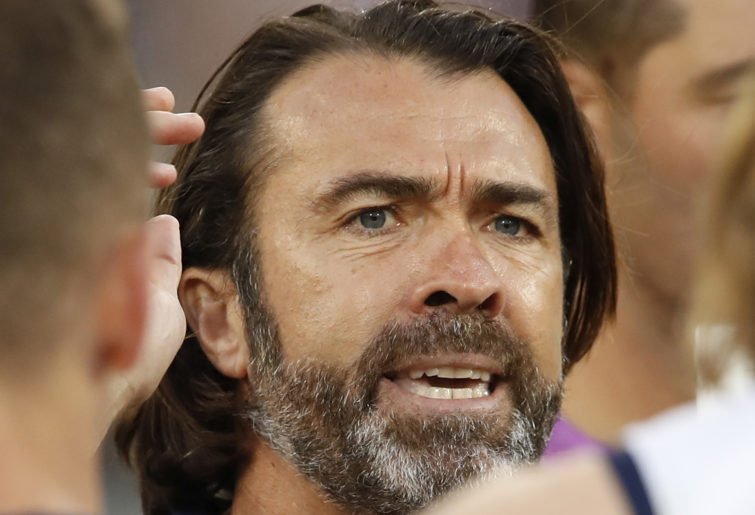
(Photo by Dylan Burns/AFL Photos via Getty Images)
What about their opponents? Does it bother the two higher-seeded clubs that despite being favoured in their semis, the two teams they’re playing just happen to be the only two teams ever to reach the grand final from a bottom-four-seeded position?
And that when the Giants won the six-seven game two years ago, they then won the semi-final when the same two teams were hosting – Brisbane and Geelong? That was the year that GWS sent Brisbane to the two-and-out dungeon as the first two seed ever.
And when the Bulldogs went through four games to win the cup in 2016, they went through GWS to get there? Who was the four seed, as Brisbane is now?
Don’t be silly. We think Geelong and Brisbane will win their semi-finals and set up preliminary finals against Melbourne and Port Adelaide, respectively.
However the odds on the Brisbane/Bulldogs game say Lions by 4.5 points. The ratings system here at Following Football thinks the gap at the Gabba is more like 10.5, so we’re recommending ‘Brisbane covers’ be the strategy in this game.
The old ‘Doggies cover any spread’ routine only works when they’re already favoured to win and we’re favouring them by even more – it’s just the opposite this time.
But the point spread on the Geelong/Giants game opened at 14.5 in the Cats’ favour and has not budged yet. Mostly, I suspect that’s a reaction to the tribunal suspending GWS lightning rod Toby Greene for the rest of finals.
But regardless of Greene’s situation, ELO-FF has this game much closer – like two minors rather than two majors.
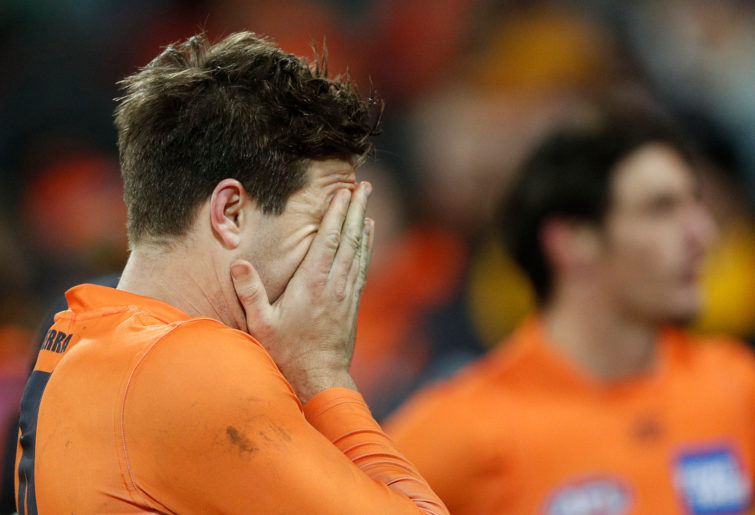
(Photo by Mark Metcalfe/AFL Photos/via Getty Images)
Two and a half points. So after playing with the possibilities for a day, I’ve decided that the wager for me is the ‘Geelong wins by less than 40 points’ option, which as of this writing doubles your wager ($4.00 on a $2 bet).
That covers your butt whether or not Greene played. If he didn’t, the line’s up around 14 and you’re safe. But even if he did play, Geelong’s still favoured by two and wins more likely than not.
But couldn’t they win by more than 40? Unlikely. While the team’s current rating is 62.8 (GWS’ is 61.0), Geelong’s one-game blast ratings for their last five games are all hovering right around the average of 50: 58.0, 27.9, 53.7, 57.3, and 48.1 last week.
That kind of streak isn’t going to beat the Giants by 40 points in a semi.
Regardless of the winners of the semi-finals, we’ve returned to the days of no pre-finals bye, which means the days of the qualifying-final winners being the only ones getting the bye and thereby having a record of 9-1 over the last five such seasons.
Port and Melbourne are more likely than not to meet in the grand final, no matter if they’re at Optus or Adelaide Oval on either weekend.
The only thing that would put a kink in their grand final plans would be a last-minute use of that bye week before the preliminary final, putting those two in a 21-day holding pattern before they play and giving the winner of this weekend’s game the advantage.
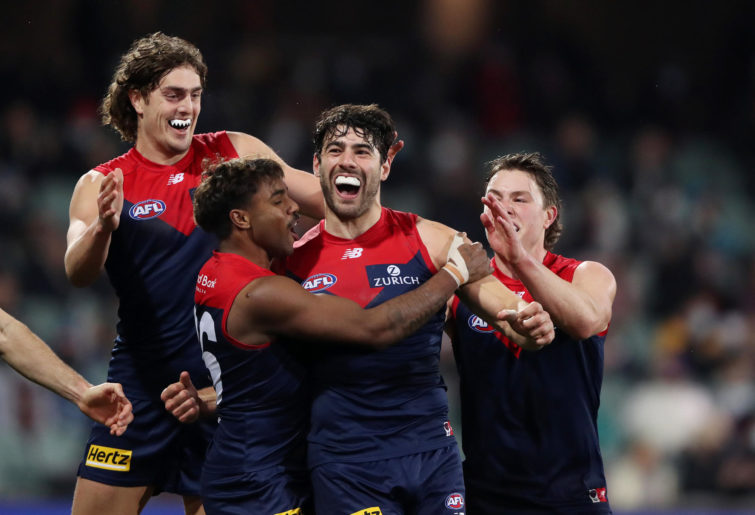
(Photo by Sarah Reed/AFL Photos via Getty Images)
The final results of the Following Football AFL Most Valuable Player for 2021, a meta-award compiling the results of 24 different sources of evaluation throughout all 23 rounds of footy, are as follows:
1. Marcus Bontempelli, Bulldogs, midfielder – 780.5 points
2. Clayton Oliver, Demons, midfielder – 756.5 points
3. Sam Walsh, Blues, midfielder – 710.5 points
4. Christian Petracca, Demons, defender – 702 points
5. Ollie Wines, Power, midfielder – 699.5
6. Jack Steele, Saints, midfielder – 685.5
7. Touk Miller, Suns, midfielder – 678
8. Darcy Parish, Bombers, midfielder – 650
9. Zach Merrett, Bombers, midfielder – 608
10. Jack Macrae, Bulldogs, midfielder – 595.5
11. Max Gawn, Demons, ruckman – 559.5
12. Tom Mitchell, Hawks, midfielder – 558.5
13. Jarryd Lyons, Lions, midfielder – 541.5
14. David Mundy, Dockers, midfielder – 503.5
15. Rory Laird, Crows, defender – 496.5
16. Dayne Zorko, Lions, midfielder – 494
17. Nic Naitanui, Eagles, ruckman – 488
18. Travis Boak, Power, midfielder – 480
19. Hugh McCluggage, Lions, midfielder – 478
20. Jake Stringer, Bombers, forward – 467.5
21. Luke Parker, Swans, midfielder – 467
22. Josh Kelly, Giants, midfielder – 458
23. Tom Stewart, Cats, defender – 448.5
24. Cam Guthrie, Cats, midfielder – 447
25. Toby Greene, Giants, forward – 434.5
26. Sean Darcy, Dockers, ruckman – 433.5
27. Callum Mills, Swans, defender – 431.5
28. Taylor Walker, Crows, forward – 416.5
29. Daniel Rich, Lions, defender – 410.5
30. Tom Hawkins, Cats, forward – 407.5
31. Karl Amon, Power, midfielder – 391.5
32. Tim Taranto, Giants, forward – 380.5
33. Andrew Brayshaw, Dockers, midfielder – 373
34. Lance Franklin, Swans, forward – 364.5
35. Tom Libertore, Bulldogs, midfielder – 356
36. Isaac Heeney, Swans, forward – 348
37. Harry McKay, Blues, forward – 345
38. Ben Keays, Crows, midfielder – 344.5
39. Jacob Weitering, Blues, defender – 343.5
40. Jack Crisp, Magpies, defender – 343
41. Dustin Martin, Tigers, midfielder – 342.5
42. Ben Cunnington, Kangaroos, midfielder – 337
43. Steven May, Demons, defender – 335
44. Christian Salem, Demons, defender – 334.5
45. Brodie Grundy, Magpies, ruckman – 332
46. Bailey Dale, Bulldogs, forward – 329.5
47. Jordan deGoey, Magpies, forward – 322.5
48. Jake Lever, Demons, defender – 321.5
49. Charlie Dixon, Power, forward – 321
50. Jordan Dawson, Swans, defender – 319.5
51. Jack Riewoldt, Tigers, forward – 319
52. Aliir Aliir, Power, defender – 317.5
You see why we’re constantly searching for sources that aren’t as midfield-focused as Brownlow voters are. There are great players at every position – it seems unimaginable that 14 of the 18 teams have a midfielder as their best player. There are three backs and a ruck leading the other four teams.
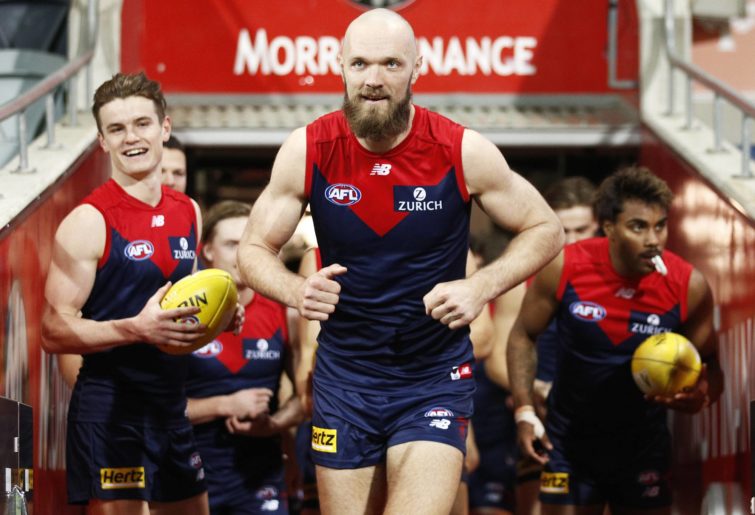
(Photo by Daniel Pockett/Getty Images)
Incidentally, if we score this using the Brownlow system of only recognising the top three players in each game, the players without any outstanding teammates to steal votes from them float to the top, whether or not they’re really the best in the league or now.
While we stand by Bontempelli as the year-long best (despite trailing off in Rounds 20-23), St Kilda’s Jack Steele has the most colour-code votes, with the top ten listed here; first-place votes/second/third (four place, tiebreakers), scored as the Brownlow does – three for first, two for second, and one for third.
1. Jack Steele (Saints) – six/six/zero (two) = 30 points
2. Marcus Bontempelli (Bulldogs) – eight/one/one (one) = 27
3. Clayton Oliver (Demons) – six/three/two (three) = 26
4. Sam Walsh (Blues) – six/two/two (three) = 24
5. Touk Miller (Suns) – six/two/two (two) = 24
6. Ollie Wines (Power) – five/three/two (five) = 23
7. Zach Merrett (Bombers) – four/three/three (two) = 21
8. Darcy Parish (Bombers) – six/zero/one (one) = 19
9. Christian Petracca (Demons) – four/one/four (one) = 18
10. (equals) Tom Mitchell (Hawks) – four/two/one (three) = 17
10. (equals) David Mundy (Dockers) – three/four/zero (three) = 17
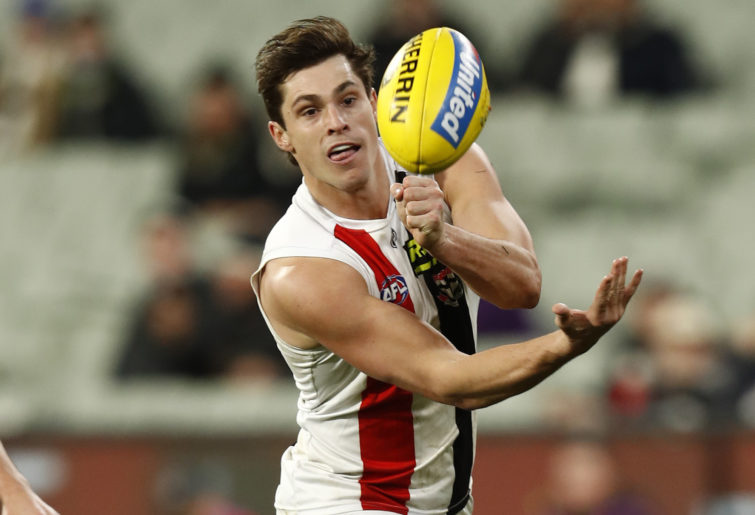
(Photo by Darrian Traynor/Getty Images)
And finally, your Following Football All-AFL first and second teams, based solely on their composite point totals (so we didn’t pay attention to specific positions within the backfield, for example).
First team
Backs: Christian Petracca (Demons), Rory Laird (Crows), Tom Stewart (Cats), Callum Mills (Swans), Daniel Rich (Lions), and Jacob Weitering (Blues).
Midfielders: Marcus Bontempelli (Bulldogs), Clayton Oliver (Demons), Sam Walsh (Blues), Ollie Wines (Power), Jack Steele (Saints), and Touk Miller (Suns).
Ruckman/forward: Max Gawn (Demons).
Forwards: Jake Stringer (Bombers), Toby Greene (Giants), Taylor Walker (Crows), Tom Hawkins (Cats), and Tim Taranto (Giants).
Second team
Backs: Jack Crisp (Magpies), Steven May (Demons), Christian Salem (Demons), Jake Lever (Demons), Jordan Dawson (Swans), and Aliir Aliir (Power).
Midfielders: Darcy Parish (Bombers), Zach Merrett (Bombers), Jack Macrae (Bulldogs), Tom Mitchell (Hawks), Jarryd Lyons (Lions), and David Mundy (Dockers).
Ruckman/forward: Nic Naitanui (Eagles).
Forwards: Lance Franklin (Swans), Isaac Heeney (Swans), Harry McKay (Blues), Bailey Dale (Bulldogs), and Jordan de Goey (Magpies).